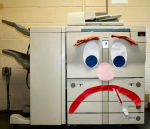 Another day; another export compliance nightmare. First it was cloud computing and now it is . . . copy machines. Seriously.
Another day; another export compliance nightmare. First it was cloud computing and now it is . . . copy machines. Seriously.
An alert reader pointed me to this CBS News story about hard drives found in almost all copy machines built after 2002. They store images of the last 20,000 or more things copied on the machines to which they are attached. Your resumé. Your tax return if you copied it at work before you sent it. The photocopy you hilariously made at the office Christmas party of, well, you know who you are and you know what I mean.
It also includes any export-controlled technical data copied on the machine. And since you probably lease that machine, your vendor comes in periodically to replace the machine, whisking away the old one, and its hard drive, and sending them to destinations unknown. Have you worked up a cold sweat yet?
The CBS reporters downloaded copies of hard drives from used copy machines Each copier was bought for $300 each. They found confidential patient medical records, details of an on-going drug investigation by the Buffalo police, and pay stubs with names, addresses and, yes, social security numbers. And I’m sure that export-controlled technical data wouldn’t be hard to find either. At the facility where CBS bought the used copy machines, two containers of used copy machines were being packed for export to Singapore and Argentina. Was your copy machine in that batch?
As soon as you finishing reading this, you probably want to take steps to make sure that copy-machine hard drives are scrubbed before the machines leave your facility and that, in the future, all export-controlled technical data or technology is only copied on secure machines that implement a factory option to erase each image from the hard drive after the copy is made.
 Permalink
Permalink
Copyright © 2010 Clif Burns. All Rights Reserved.
(No republication, syndication or use permitted without my consent.)

 Posted by
Posted by  Category:
Category: 

